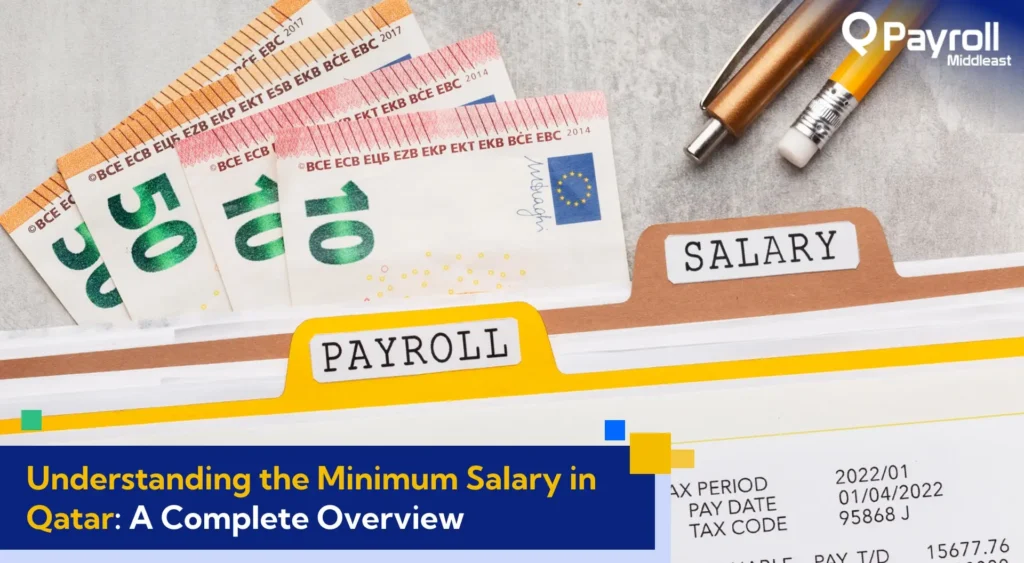Constant change, being updated or revamped — that’s the very definition of dynamic, which is the direct contrast to static. When we talk about a dynamic workforce, that of course means there is some change constantly happening. Change isn’t a bad thing, per se. It is good, it is scary, it is inevitable — something we shouldn’t try to prevent but instead be prepared for. Now when it comes to these said changes happening in workforce, they come with their fair share of opportunities and challenges of employees as well as employers. One such noteworthy update happened with the minimum salary in Qatar. It is a topic that deserves its due attention by anyone who is involved in business operations or is employed in the country.
Our blog post mainly discusses these points.
- Minimum wage Qatar — what’s the big deal?
- What is covered in Qatar’s minimum salary?
- Empowering workers, building the foundations of ethical businesses, and enhancing the global perception — Are the ripple effects being felt with wage regulations?
- How payroll services are the underrated heroes championing compliance?
- Qatar’s wage system in the grand scheme of things
- Wage compliance and strategic HR – Why do they matter?
- Technology’s role in efficient payroll
- Why is competitive compensation necessary for creating a culture of appreciation and employees’ loyalty?
- Gratuity and employee retention
- How Qatar’s minimum wage is the starting point for ethical payroll practices
- Qatar Labor Law: What’s covered?
- What can you expect down the road with a fair wage system implemented?
A Landmark Move — Qatar’s Progressive Wage Reform
We remember when back in March 2021, Qatar made some headlines. That was when it introduced its first-ever minimum wage law. It is evident how the decision was more than mere regulatory housekeeping. For many workers across the industries, it was a defining moment. At the time of writing this piece, the minimum salary in Qatar is said to be set at QAR 1,000 per month, with QAR 500 for housing allowance and 300 QAR for food allowance when these facilities aren’t provided by employers.
As the country is heavily reliant on expat labor, this policy marked a significant shift towards fairness and worker empowerment.
For a country heavily reliant on expatriate labor, this policy marked a significant shift toward fairness and worker empowerment. Employers now have clear guidelines that enhance trust and improve transparency across the board.
Workers weren’t the only ones who welcomed this change. It resonated with ethical businesses who were establishing themselves as employee-focused brands.
Breaking Down the Numbers – What Does the Minimum Salary Cover?
The minimum salary in Qatar ensures basic financial security for workers. Here’s how the numbers translate into tangible benefits –
- QAR 1,000 (Basic Pay) – Covers general living expenses.
- QAR 500 (Housing Allowance) – Offers decent accommodation when housing isn’t provided.
- QAR 300 (Food Allowance) – Supports daily sustenance needs.
While the figures are standardized, businesses that want to attract and retain top talent often go beyond these numbers. They work on adding value through additional perks and benefits.
Wage Regulation: Its Ripple Effects Are Here
We would go as far as to say that the introduction of a minimum wage is a game-changer for businesses and workers alike.
1. Workers Empowered
The wage law boosts morale and ensures fair compensation, especially for low-income earners. This not only impacts financial stability. It also improves productivity and workplace satisfaction.
2. Ethical Businesses Built
For employers, meeting or exceeding the minimum salary in Qatar shows their commitment to fairness and ethical labor practices. It sets the stage for a loyal workforce and a positive brand reputation.
3. Global Perception Enhanced
Qatar’s wage law aligns with international labor standards. This enhances its reputation as a country that prioritizes its workers’ rights. For businesses, this creates an environment of trust that attracts global talent and partnerships.
The Unsung Hero of Compliance: Payroll Services
Handling payroll is no small feat. Especially when ensuring compliance with regulations for minimum salary in Qatar. For businesses operating in a competitive environment, accurate and timely payroll management can make or break operations.
This is where payroll outsourcing steps in as a reliable ally. Outsourcing payroll to trusted providers simplifies processes. This, in turn, reduces errors and ensures compliance with labor laws. Employers can focus on their strategic growth and leave the complexities of wage calculations to experts.
A reliable payroll service in Qatar is a tool and a necessity – all in one – for modern businesses aiming to scale.
From Wage Compliance to Strategic HR – Why Does It All Matter?
Being a checkbox on a to-do list isn’t all that there is to wage compliance. It is a core component of strategic HR management. When you follow the regulations for the Qatar minimum wage, your company can leverage several benefits.
1. Reduced Employee Turnover
Fair wages and timely payments build trust and loyalty among your employees. It also reduces turnover rates and recruitment costs.
2. Improved Productivity
Satisfied employees are more productive. Competitive wages show that employers value their contributions. This creates a motivated workforce.
3. Legal Protection
Staying compliant with Qatar labor law protects businesses from potential penalties or legal disputes.
How Qatar’s Wage System Stacks Up Regionally
We think there is something fascinating in looking at wages with a regional lens. We get to compare the differences present, in this regard, in the GCC region.
- Qatar – A universal minimum wage of QAR 1,000/month with allowances for housing and food.
- Oman – The minimum wage in Oman is exclusive to nationals, at OMR 325 per month.
- UAE – There’s no fixed federal minimum wage. But certain job categories have salary standards to ensure fair compensation.
These comparisons highlight Qatar’s commitment to fairness and its progressive attitude towards labor rights.
The Role of Technology in Payroll Efficiency
It’s a digital era we are living in. Technology has changed how businesses manage their payroll. For employers in Qatar, integrating advanced tools ensures compliance with the minimum salary in Qatar.
1. Gratuity Calculations Made Easy
The gratuity calculator Qatar is a prime example of how technology simplifies compliance. When you automate end of service benefit calculations, your business can avoid errors and maintain transparency with employees.
2. Data-Driven Decisions
Payroll software provides insights into labor costs, overtime, and compliance. It empowers businesses to make informed decisions that meet budgetary goals and regulatory requirements.
3. Global Payroll Integration
For companies with cross-border operations, integrating payroll systems across countries — such as setting up a salary account in UAE for employees — ensures simplified transactions and consistent compliance.
Going Beyond the Basics – Competitive Compensation Strategies
Sticking to the minimum salary in Qatar is compulsory. Businesses that want to stand out often go the extra mile. Competitive compensation strategies include the following.
- Performance Bonuses – Incentivize employees for exceeding expectations.
- Health and Wellness Benefits – Cover medical expenses and offer gym memberships or wellness programs.
- Housing and Travel Allowances – Provide additional support to expatriates adjusting to life in Qatar.
These strategies not only attract talent. It also creates a culture of appreciation and loyalty.
An Important Aspect of Employee Retention: Gratuity
In Qatar, gratuity payments are a foundation of employee benefits. They signify an employer’s gratitude for years of service. This makes calculating gratuity accurately important. With the right tools including gratuity calculator Qatar, you can simplify the process.
This benefit also highlights the importance of long term employment relationships. Employees feel valued, which in turn boosts retention and reduces turnover.
Shaping the Future with Ethical Payroll Practices
As Qatar continues to progress as a global business center, ethical payroll practices will define the success of businesses operating here. Regulations such as Qatar minimum wage is a starting point
The Foundation of Qatar’s Wage Structure
Qatar has grown into a hub for international business. The country is attracting a broad talent pool from around the globe. To guarantee fair treatment and compensation for workers, Qatar implemented its first ever minimum wage law way back in March 2021. This move ensures that no worker is paid less than QAR 1,000 per month. There’s an additional allocation of QAR 500 for accommodation and QAR 300 for food. This applies where employers do not directly provide these.
The minimum salary in Qatar sets the baseline. Businesses often pay above this threshold to attract top talent.
Why the Minimum Salary in Qatar Matters for Employers?
For employers, following wage regulations isn’t optional. It’s a reflection of corporate integrity. Other than avoiding penalties, businesses that respect Qatar’s labor laws nurture loyalty and productivity. Employees who feel valued are more likely to contribute positively. This, in turn, reduces turnover and recruitment costs.
This regulation also levels the playing field. It makes sure that businesses across industries maintain fair labor practices. Companies engaged in payroll outsourcing often find it easier to comply. Because experts manage wage calculations and legal requirements.
Highlights of Qatar’s Labor Law
The Qatar Labor Law governs more than wages. It contributes to strong employment relationships. For employers, understanding these rules is essential to avoid legal pitfalls. Some critical areas covered include –
- Working hours – The standard is 48 hours per week. That’s with overtime provisions in place.
- Annual leave – Employees are entitled to at least three weeks of paid leave annually.
- Gratuity payments – There are certain tools to simplify these calculations. A gratuity calculator Qatar is one such example.
Payroll Management — The Backbone of Compliance
Having to make sure you are not violating any payroll regulations can be stressful. Especially if you are managing a large workforce. That’s because every tiny detail matters, be it calculating wages or ensuring timely payments. Companies often turn to payroll outsourcing to simplify their operations, minimize errors, and maintain compliance with regulations for minimum salary in Qatar.
Our reliable payroll service in Qatar does way more than crunching some numbers. With us, you have peace of mind. When you outsource to us, you can focus on growing your business and leave the complexities of payroll to our experts.
Regional Insights — Comparing Qatar with Its Neighbors
Qatar isn’t the only GCC country with a regulated wage structure. Neighboring countries have their own systems, offering interesting comparisons.
- Oman – The minimum wage in Oman is set at OMR 325 per month for nationals. And there’s no universal minimum wage for expatriates.
- UAE – There’s no federal minimum wage, salary structures for employees often depend on job categories and are according to the government approved standards.
These variations highlight Qatar’s progressive approach to wage regulation, especially considering its diverse expatriate workforce.
Practical Tips for Employers in Qatar
To ensure compliance and build a motivated workforce, businesses should adopt best practices tailored to Qatar’s unique landscape –
1. Keeping up with Legal Updates
Qatar’s labor policies are evolving. Regularly reviewing updates ensures that businesses remain ahead of the curve.
2. Leverage Payroll Technology
Modern payroll solutions simplify compliance. They make sure that employees are paid accurately and on time. This is particularly beneficial for handling complex calculations for end of service benefits using a gratuity calculator Qatar.
3. Offer Competitive Benefits
Meeting the minimum salary in Qatar is a must. Offering additional perks such as housing allowances, insurance, and travel benefits helps attract top talent.
4. Simplifying Bank Transfers
Setting up a salary account in UAE or Qatar ensures simplified transactions, especially for expatriate workers. It’s a win-win, enhancing trust and operational efficiency.
Challenges and Opportunities in Payroll Compliance
While Qatar’s wage policies aim to protect workers, employers face challenges in ensuring compliance. This is where expert payroll services come in. From tracking work hours to managing allowances, a dependable payroll service in Qatar can transform payroll from a pain point to a strength.
There are a lot of opportunities available. Following labour laws and prioritizing employee well-being, you can establish your business as employers of choice in Qatar’s competitive market.
The Role of Gratuity and Benefits in Employee Satisfaction
End of service gratuity isn’t only a legal requirement. It is a symbol of respect for your employees’ contributions. Your business can use our gratuity calculator Qatar to ensure accurate and transparent payouts. Goodwill is promoted this way and employee retention is encouraged in the long run.
Offering competitive benefits – including housing, healthcare, and education allowances – goes beyond the basics of the minimum salary in Qatar. It’s a strategy to stand out in a crowded employer market.
Building Ethical Payroll Practices
For businesses in Qatar, compliance isn’t only about meeting the minimum requirements. It’s about fostering a culture of fairness and transparency. With payroll outsourcing, companies can ensure they’re not only compliant but also proactive in creating ethical payroll practices.
Transparent payroll policies enhance trust among employees, especially in regions like the GCC, where workers come from diverse backgrounds. By adhering to regulations and promoting fairness, businesses can strengthen their reputation and attract top talent.
The Road Ahead – Embracing a Fair Wage Ecosystem
Qatar’s commitment to a fair wage structure is the right step toward building an economy that benefits its workers as well as businesses. The minimum salary in Qatar acts as a foundation, ensuring that all employees earn a dignified income. For businesses, understanding and embracing this system is key to long term success.
As the labor laws go through changes, keeping up with these advancements and complying with them is more important than ever. Whether through in house efforts or with the help of a payroll service in Qatar, businesses have the tools to build a future where compliance meets compassion.
With prioritizing fairness, leveraging technology, and maintaining a competitive edge, Qatar’s business market is set to flourish. And for employees, this means that their contributions are valued and rewarded in line with the nation’s progressive labor policies.
Take your payroll game to the next level. Partner with our experts who understand Qatar’s labor laws inside and out.
Contact us for our services.






Self-Appraisal Comments by Employee: Example